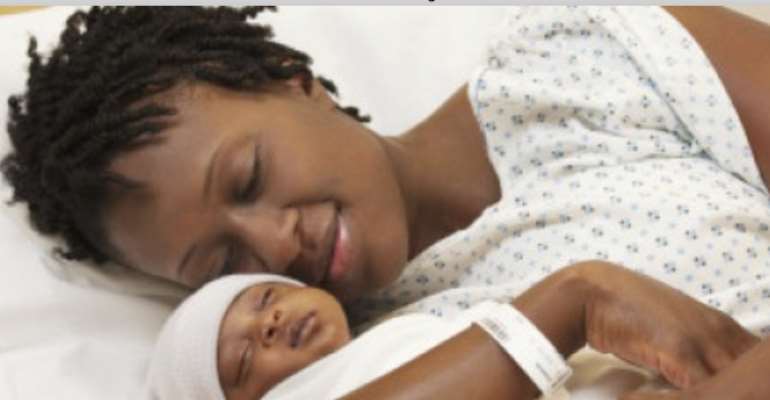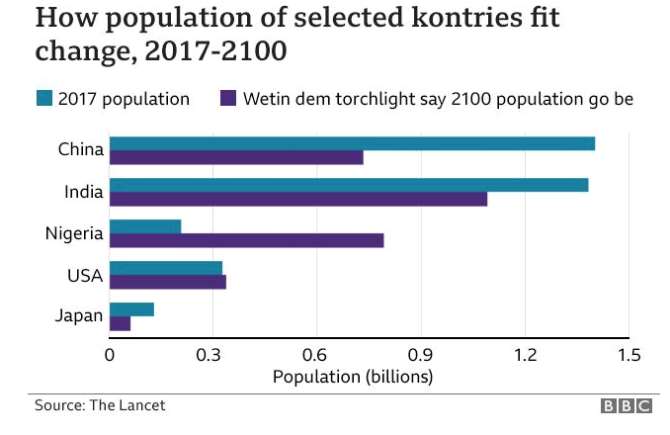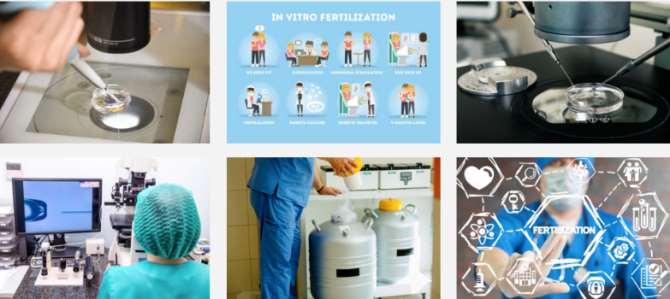Infertility: Poor Experience Of Women In Marriage Whereas Men Take Pride

•The Traumatic Experience of Barren Women Years After Marriage
- Each couple’s ripeness issue is exceptional
- The fault doesn’t only come from the woman but the man too
- Men account for 30% of all fruitlessness issues, while women account for 30%
- For certain men, the semen has no sperm
- In specific cases, current science can’t pinpoint what’s going on
Infertility is a significant issue, particularly in Nigeria, where the woman is frequently the sufferer and faces social stigma, not minding that the World Health Organization (WHO) said barrenness is an illness of both male and female regenerative organs.
Worried by that, the medical director of NISA Reproductive Health Centre, Kaduna, Dr. Selma Yahaya, said 10–30% of couples have a burden of infertility in Nigeria. Against this backdrop, Ms. Treasure Johnson is one of the many women who have not only experienced the shoddy angle of being unable to have a child but also have sorry tales to detest about their experience.
The 45-year-old woman who once bore Mrs. as a title has dropped it and is now searching for a husband. Her experience is so harrowing that she was called barren by her mother-in-law because she could not conceive. Poverty also made their chances of trying In vitro fertilization (popularly known as IVF) a herculean task.
In vitro fertilization is a type of fertilization when an egg and sperm are united inside of a dish.
Monitoring and boosting a woman’s ovulatory cycle is part of the procedure, as is taking an ovum or an oval from her ovaries and allowing sperm to fertilize them in a culture medium in a lab. Johnson’s husband kicked against her proposal for adoption, too.
He wanted his own biological child. Ms. Treasure Johnson, which is not her real name, was chased out of her once happy marriage of seven years. Her in-laws were furious when one of her then-sister-in-laws gave birth within a year of their marriage during the time she was with her then-husband.
One of her most difficult recollections was the point at which her mother by marriage alluded to her as a desolate lady as she took care of visitors who had visited her then-husband.
According to Johnson, “Things developed from terrible to more regrettable when my mother by marriage started to obnoxiously and genuinely misuse me. My spouse was told not to bring me to family occasions as questions encompassing my fruitlessness would be raised and examined.
“I believed that the ground should open up and swallow me. I’d never felt so embarrassed in all my years. My spouse’s’ visitors were in shock as silence occupied the room and tears started to move down my cheeks.”
She was forced to move out of her marriage in 2021, but Johnson didn’t give up hope on trying to conceive with another man, even though a doctor who conducted several tests on her former husband and her warned that she was responsible for her childlessness and her chances of conceiving were slim.
But that wasn’t enough for her to give up hope. She conceived naturally with her new man, and her joy knew no bounds. She is now walking the streets with her head held high, not wishing her adversaries to her enemies. When she looks back, she doesn’t in earnest regret the wheedles heaped on her, but her then-husband never defended her before his family members.
Her in-laws addressed her as “man of the house” on several occasions. That she could not conceive, as men don’t.
Many contemptible words were used against her for not conceiving, such as “witch” and “abortion partaker.” This came from her mother-in-law, who said to her face that she had undergone several abortions, which was the reason for her childlessness.
It was like the whole world was against her but has now come closer to her since she gave birth. Even her ex-husband is among them and is pleading with her to come back since neither of them has chosen a new spouse. Nonetheless, this is something she will not like to do.
While the experience of Johnson might be touchy, Mrs. Modupe Gabriel, a school proprietress in Lagos, had a bitter version of the experience women looking for the fruit of the womb go through.
Gabriel was 49. She said she had remarkable success in having a child naturally after a battle with infertility for over 23 years and even had a failed IVF attempt.
The charmed mother said, “I was affirmed pregnant a couple of months after my 49th birthday celebration. People had encouraged me to do the unthinkable and have a child.I burned through a truckload of cash going to emergency clinics. I’ve had a failed IVF, but I’ve continued to trust in God.
“I’ve generally accepted that whatever God might not give me, I don’t need it. We stood by without complaining, and it was, to be sure, worth the effort. However, it appears to be so extreme and deterring. In any case, with God close by, it turned into a relic of past times.”
Her success in having a child being within the age range of 40–50 has raised concerns, given experts’ fear that a woman conceiving naturally at that age bracket may lead to her or her child having health challenges.
Specialists’ view is that a lot of women in their 40s have children, but they have a high risk of hereditary irregularity.
However, as long as the woman is not menopausal, they may have a couple of eggs and those eggs can still bear children. However, by the age of 59, most women in that age group will be menopausal, and menopause essentially means no more eggs.
“I was informed I had gotten to my menopausal stage, but I was all the while menstruating. At the point when I was affirmed pregnant, my PCP let me know I should have been on bed rest, yet I was solid and I had the option to go about my business at school. I wasn’t inactive or apathetic; I was up and doing,” she added.
By the age of 59, specialists say, on the off chance that such an individual bleeds, it will send a frenzy to the specialists in light of the fact that the individual may be managing growths.
Understanding infertility
According to professionals, there are two common known types of infertility, and neither of them involves becoming pregnant despite having well planned, unprotected sex for a year:
Couples who have not become pregnant after at least a year of having sex without taking birth control are said to have primary infertility.
Couples who have had at least one successful pregnancy but are now unable to produce children are said to have secondary infertility.
Checks revealed that Nigeria’s fertility rate is gradually declining. This is the case despite being ranked 16th among nations with the highest fertility rates. The average number of children a woman would have over her lifetime, assuming she lived from birth until the end of her reproductive years and had acceptable age-specific fertility rates, is simply known as her fertility rate. The average fertility rate worldwide is 2.4 children for per woman, but it is 4.67 in Nigeria (April 2021). However, this is in contrast to 6.8 in 1980, 5.3 in 2019, and 5.1 in 2017. According to recent projections, Nigeria will have a 1.7 fertility rate in 2100.
Not just in Nigeria
The WHO measurements show that barrenness is an issue that influences a great many individuals of a conceptual age universally. These measurements gauge that between 48 million couples and 186 million people live with fruitlessness around the world.
The inquiry into why Johnson had the option to conceive notwithstanding scaremongering caution by a specialist, Dr. Yahaya, brought up the purposes behind infertility, saying it tends to be in the man or in the woman or in the two of them. He stated that a man could be tested to see if he had produced sperm, assuming he was able to discharge the sperm, that is, bring it out, and assuming the sperm was of sufficient quantity and quality.
As per Yahaya, “When a man discharges, that whitish substance you see is called semen. Semen should contain the real sperm, which is the male seed. For certain men, the semen has no sperm.
“This might be on the grounds that the way through which the sperm ought to stream into the semen is impeded.
“A few men don’t for even a moment make sperm at all since there was harm when they were in their mom’s belly or even in their life as a youngster. A few men have low quality and quantity of sperm.
“For the lady, she might generally disapprove of her ovaries and eggs not being delivered to be prepared by the sperm. Her Fallopian cylinders might be hindered, and the eggs and sperm can’t move. Her belly might be harmed by a medical procedure or sickness, and a pregnancy can’t be harmed there.
“In some cases, ladies are brought into the world with these issues because of harm that happened while they were in their mom’s bellies. At the point of several visits to a infertility place, this large number of regions are checked out and afterward, arrangements are advertised.”
Other fertility options
Many women in Johnson’s position who are having difficulty conceiving, according to specialists, have many more options for fertility than writhing in agony and pain.
A fertility specialist, Dr Nathaniel Adewole, in a presentation said, “Unlike before, when people were not so comfortable with other fertility options, women are now open to trying other fertility options.
“We now have public and private hospitals that offer IVF treatment, and they have also turned out to be very successful. Public hospitals which offer the services may charge N700, 000, while the bill from a private hospital can run into N1.5 million at least.
“I’m also glad that the perception of infertility in Nigeria is changing as people are now beginning to understand that the fault doesn’t only come from the woman but the man too.”
Dr. Abayomi Ajayi (consultant obstetrician and gynecologist)
A large number are ignorant
A consultant obstetrician and gynecologist, Dr. Abayomi Ajayi, said more than 50% of women living with endometriosis endure infertility without large numbers of them knowing it. Hence, endometriosis should not be overlooked as a cause of female infertility while in search for a fertility solution.
Dr. Yahaya found out that the primary problem is that couples don’t look for help early. When a man and a woman have been having customary intercourse (that is around 2-3 times each week) for a year without utilizing any contraceptives or family planning and they have not conceived a pregnancy, they ought to look for help at a respectable rich place.
Ajayi advised women like Johnson and Gabriel, who had gone through the agony of barrenness, and emphasized the importance of assisting women suffering from the condition in seeking help at the most appropriate time.
He went on to say that endometriosis is a condition that affects more than two to ten percent of women worldwide and is a major cause of infertility in more than half of those who have it. As a result, the world must pay attention to assisting women affected by its impact to find assistance at the most appropriate time.
Disadvantage: coming for medical help so late
The source said they see individuals coming for medical help so late, here and there, after off-base treatment. In some cases, the woman is well beyond 35 years of age.
One thing barren couples should keep in mind is that fertility for a lady has a time limit, whereas fertility for a man doesn’t. So, if a couple has been waiting to picture normally and the lady is approaching 35 years of age, they should change their procedure and go to a legitimate fertility place.
One more test specialists offer is based on off-base data about ripeness treatment. At NISA, investigation says they represent trustworthiness and straightforwardness. They come clean with their clients about their circumstances and the arrangements that are available.
The source said it is then dependent upon the clients to settle on an educated conclusion about what to do. The specialists see clients who have denied themselves early mediation because of wrong data courses locally. Another challenge specialists face is that some clients cannot afford the type of fertility administration they require.
The experts nonetheless work around these difficulties by having illumination crusades on the radio and by point-by-point guiding of every client they see to stop the spread of wrong data. They also provide limited administrative support to their less financially savvy clients.
Treatment goes from straightforward guiding to taking medication to carrying out methods. The best way to understand the treatment required is to visit a mature area. The younger a lady is, the more likely it is that she will receive fruitful and rich treatment. Each couple’s ripeness issue is exceptional, so don’t depend on what worked for someone else. Couples should be wary of conventional prescriptions as well as quack health care providers who claim to have a 100% success rate. Indeed, even nature doesn’t give a 100 percent achievement rate in pregnancy consistently.
The doctor says he might want to speak to all couples who have not had the option to achieve a pregnancy after no less than one year of attempting to visit a legitimate fertility center. He would also encourage all women who have been diagnosed with obstructed fallopian cylinders to consider IVF treatment as their most memorable choice of fertility treatment.
Considering that, Ajayi prompted that a second justification for worldwide worry for this purpose is the way that examination has shown that this condition influences ladies in their conceptive ages, beginning in the early long stretches of optional school when most young ladies see their month-to-month feminine period interestingly. In reality, for 60% of women who have endometriosis, the side effects begin before the age of 20.
Infertility is now a disease. Everyone has the right to health
As indicated by the World Health Organization, everybody has the option to achieve a norm of physical and emotional well-being. Barrenness negatively affects a couple’s emotional well-being, influencing their lifestyle.
Luckily, mental mediation, especially those zeroing in on pressure from the board and adapting abilities while preparing, has been shown to help fruitless patients.
Barrenness is a complex and critical life-altering situation that includes social and mental issues.
Dr. Ibrahim Wada, leader of the Association for Fertility and Reproductive Health (AFTH), portrayed specific instances of childlessness among couples as “unexplained barrenness.” He said current science can not pinpoint what’s going on in these cases, which is around 20% of fruitlessness cases in Nigeria.
Ajayi reasoned that in various nations where exploration has been done broadly regarding the matter, juvenile females have been recognized as a basic group troubled with endometriosis on the grounds that the condition would have begun at that youthful age, but it may not be analyzed right on time until the young adult victim develops into adulthood with worries connected with fruitlessness.
At a press conference in recognition of World Fertility Day in Abuja at the end of the week, Wada, who is likewise the pioneer behind Nisa Medical Group, expressed this at a press conference.
He claims that men account for 30% of all fruitlessness issues, while women account for 30%. Roughly 15% are blended, implying that both the men and the ladies have one issue or the other, while 20% can’t be made sense of.
For the two couples, barrenness is a situational emergency that is monetarily testing, sincerely depleting, truly difficult, and mentally undermining more often than not.
On the reasons for fruitlessness, Wada said, “The World Health Organization (WHO) and the International Federation of Fertility Societies (IFFS) obviously perceive barrenness as a sickness.” They say individuals ought to see the case as half for the man and half for the woman.
“Most of the time, all attention is on the lady, so we realized that men can generally dislike their sperm; either with few sperm, no sperm, or they aren’t moving, and that’s what things like. We likewise expressed that for the lady; there could be some kind of problem with her delivering the eggs. Perhaps something is wrong with her vehicle’s framework. We said, “In specific cases, current science can’t pinpoint what’s going on, so we call that unexplained barrenness.”
Parenting doors are changing
The first black Secretary-General of the International Federation of Fertility Societies and President, Academy of Medicine Specialties of Nigeria, Prof Oladapo Ashiru, on the development of ART and its guidelines in Nigeria, said during the festival of World Infertility Awareness Month in June, that a ton has changed in open doors for parenting.
For instance, June is currently celebrated as World Infertility Awareness Month. Each June, World Infertility Awareness Month is commended for increasing mindfulness in regards to the various fruitlessness issues faced by couples across the globe.
It incorporates issues connected to female as well as male fertility. A few fantasies in regards to infertility are exposed during this month, and numerous choices are presented for the people who might need to consider them. The reason for the month is to work on the existence of millions of individuals who neglect to consider it because of an absence of logical information.
Thus, in Africa, to de-trash infertility fantasies, indeed, certain purposes of barrenness can be survived. All that is needed is a decent specialist, a steady family, and a receptive outlook. Fertility training zeroing in on preventable causes like physically communicable illnesses, word-related risks, ecological and environmental changes, and wholesome and dietary causes would be featured. The International Federation of Fertility Societies, in association with the MERCK Foundation, commended the month with a World Infertility Summit on June 24th for all who have an interest in fruitfulness.
Different changes included different choices to address the various reasons for barrenness. They range from a basic understanding of the specific potential dates for origination, ovulation enlistment, sperm improvement systems, ART, including IVF-ET, Intracytoplasmic Sperm Injection, contributor eggs and sperm, gestational surrogacy, and pre-implantation hereditary finding with undifferentiated cell treatment. The exploration goes on day-to-day.
Despite the fact that people might respond diversely to this, women are frequently seen to be barren, whether or not they are fruitless.
- Odimegwu Onwumere writes from Rivers state via: [email protected]





